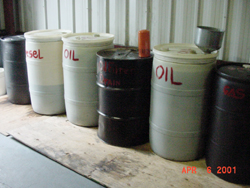New York Sea Grant's
Marina Pollution Prevention Web Site
Section 1: Mechanical Activities
-
Commissioning Engines
Potential Environmental Impacts
The
waste fluids generated when commissioning engines on the  upland,
if not properly managed, can potentially enter the water in storm
water runoff. Contact with the fluids can harm fish and other
marine and aquatic life. If certain fluids are mixed, they may
become subject to hazardous waste requirements and be more expensive
to dispose. Waste fluids from commissioning engines may include
engine oil, gasoline, diesel fuel, transmission fluid and antifreeze. upland,
if not properly managed, can potentially enter the water in storm
water runoff. Contact with the fluids can harm fish and other
marine and aquatic life. If certain fluids are mixed, they may
become subject to hazardous waste requirements and be more expensive
to dispose. Waste fluids from commissioning engines may include
engine oil, gasoline, diesel fuel, transmission fluid and antifreeze.
Best Management Practices
- Inspect fuel
lines for leaks or potential leaks such as cracks and loose connections.
These can be persistent problems that last throughout the season,
leaking engine fluids into the bilge and should be corrected before
launching.
- Household
hazardous waste programs may accept unwanted gasoline and gas/oil
blends generated by individual boat owners. Encourage marina patrons
to dispose of their waste gasoline through their own municipal
household hazardous waste collection programs, if appropriate.
Regulatory
Issues
- Waste gasoline
is not considered a hazardous waste if it is recycled or burned
as a fuel. Waste gasoline should be stored in properly grounded,
labeled and closed containers on an impermeable surface with spill
controls.
- If stale
gasoline cannot be reconditioned, dispose of it as hazardous waste
[40 CFR 262.11] click
here. For more information on New York's Hazardous
Waste Regulations and storage requirements, click here, pdf.
- If there
is a stormwater discharge from your facility and you perform any
outdoor vessel maintenance or repair, including commissioning
or decommissioning engines, you may have to register for a General
Permit for the Discharge of Storm Water Associated with Industrial
Activity ("Storm Water General Permit"). For more information
on stormwater permitting in New York, click
here.
- If doing
an oil change, see "Oil Changes,"
(click
here).
- See "Antifreeze"
(click
here) to determine how to handle, store
and dispose of antifreeze used to winterize engines.
- Manage soiled
rags as described in "Rags" (click
here)
|

